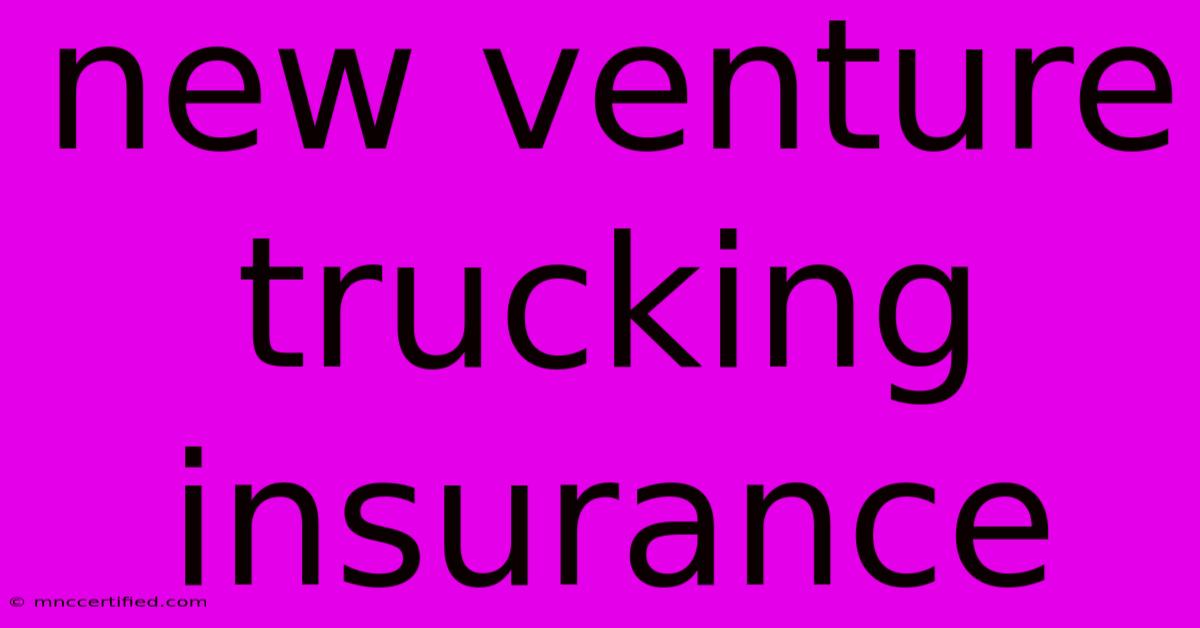New Venture Trucking Insurance

Table of Contents
Navigating the Road Ahead: Your Guide to New Venture Trucking Insurance
Starting a trucking business is exciting, but the complexities of insurance can feel overwhelming. Securing the right coverage is crucial for protecting your assets, your drivers, and your future. This comprehensive guide will walk you through the essential aspects of new venture trucking insurance, helping you navigate this crucial step with confidence.
Understanding the Unique Needs of New Trucking Businesses
Unlike established trucking companies, new ventures face specific insurance challenges. Lenders often require proof of insurance before approving loans, and securing contracts with shippers frequently hinges on demonstrating adequate coverage. Moreover, a strong insurance policy protects your fledgling business from potential financial ruin stemming from accidents or lawsuits. Finding the right balance between comprehensive protection and affordability is key.
Key Considerations for New Venture Trucking Insurance:
- Type of Authority: Your insurance needs will vary depending on whether you're operating under a Federal Motor Carrier Safety Administration (FMCSA) operating authority or as an exempt carrier. FMCSA regulations mandate specific minimum insurance requirements.
- Cargo Insurance: Protecting the goods you transport is paramount. Cargo insurance covers loss or damage to cargo while in your possession. The type of cargo and the value of shipments will determine the appropriate coverage.
- Liability Coverage: This protects you against claims of bodily injury or property damage caused by your trucks. Adequate liability coverage is crucial for mitigating potential financial losses from accidents. Consider higher limits than the minimum requirements, especially as a new business with less financial cushion.
- Physical Damage Coverage: This covers damage to your trucks due to accidents, vandalism, or other incidents. Protecting your valuable equipment is essential for the continued operation of your business.
- Bobtail Insurance: This covers liability and physical damage when your truck is not connected to a trailer. It's a crucial component of comprehensive coverage.
- Non-Trucking Use Coverage: If you use your trucks for personal use, this coverage protects you from liability during those times.
- Workers' Compensation: If you employ drivers, workers' compensation insurance is legally mandated in most states. It protects your employees in case of work-related injuries.
Finding the Right New Venture Trucking Insurance Provider
Shopping for insurance can be daunting, but focusing on these factors will help you secure the best coverage for your needs:
- Reputation and Financial Stability: Choose an insurer with a strong reputation for claims processing and financial stability. Check ratings from agencies like A.M. Best.
- Customization Options: Your insurance needs will evolve as your business grows. Choose a provider that offers flexible options and allows you to adjust your coverage as needed.
- Competitive Pricing: Get quotes from multiple providers to compare prices and coverage options. Don't solely focus on the cheapest option; ensure adequate coverage is prioritized.
- Excellent Customer Service: Responsive and helpful customer service is invaluable, particularly when dealing with claims.
Tips for Obtaining Favorable Rates:
- Maintain a Clean Driving Record: A good driving record significantly impacts your insurance premiums.
- Implement a Robust Safety Program: Demonstrating a commitment to safety can result in lower premiums.
- Invest in Telematics: Using telematics devices can monitor driver behavior and improve safety, potentially leading to discounts.
- Bundle Policies: Combining multiple insurance policies, such as cargo and liability, with one provider might offer discounts.
Beyond the Basics: Protecting Your Growing Business
As your trucking business expands, your insurance needs will become more sophisticated. Consider these advanced options:
- General Liability: Protects your business from claims of negligence or property damage unrelated to trucking operations.
- Umbrella Liability: Provides additional liability coverage beyond the limits of your primary policies, offering crucial protection against catastrophic events.
- Environmental Liability: If your operations involve hazardous materials, environmental liability insurance is crucial.
Obtaining the right new venture trucking insurance is a crucial investment in your business's success. By carefully considering your needs, comparing options, and proactively managing risk, you can protect your business and pave the way for a prosperous future on the road. Remember to consult with an insurance professional to ensure you have the most appropriate coverage for your unique circumstances.

Thank you for visiting our website wich cover about New Venture Trucking Insurance. We hope the information provided has been useful to you. Feel free to contact us if you have any questions or need further assistance. See you next time and dont miss to bookmark.
Featured Posts
-
London Underground Elizabeth Line Delays
Nov 27, 2024
-
Brest Vs Barcelona 3 0 Final Score
Nov 27, 2024
-
Rental Car Insurance Australia
Nov 27, 2024
-
Scientists Amaze 35 000 Year Old Cub
Nov 27, 2024
-
Social Protection And Health Equity Webinar
Nov 27, 2024